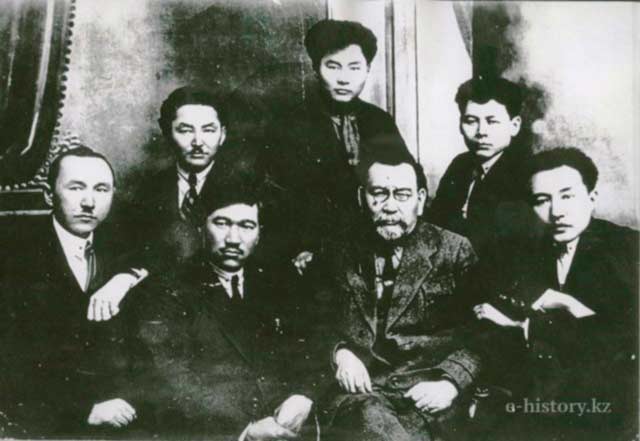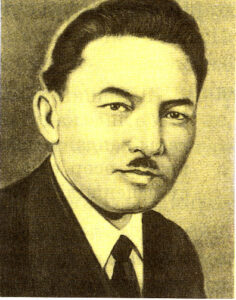ASTANA – Kazakhstan commemorates the 135th anniversary of Zhusipbek Aimauytov, an esteemed novelist whose modernist vision amplified the voices of women. His birth on March 8, coinciding with International Women’s Day, seems a fateful coincidence, as his later novel “Akbilek” would champion the empowerment of Kazakh women through education.

Members of the Alash party. First row: X. Gabbasov, M. Dulatov, A. Baitursynov, M. Auezov. Second row: J. Aimauytov, A. Margulan, A. Baitasov. Photo credit:e-history.kz
Aimauytov provoked and inspired readers with his novels, scientific works on teaching and psychology, as well as his drama plays throughout his versatile literary career.
Born in 1889, he grew up in Kyzyltau village, a place that now bears his name, located in the Pavlodar Region. He attended the Russian-Kazakh school in Pavlodar before enrolling in the Semipalatinsk teacher’s seminary in 1914. By 1918, he had become actively involved in the Alash Orda party.
Aimauytov’s compassion amidst famine

Zhusipbek Aimauytov. Photo from open sources.
Aimauytov lived through momentous transformations of Kazakh society, from the February Revolution of 1917 to the advent of communism and the famine of 1921-1922 in the Kazakh steppe. Throughout all this, he maintained his sense of compassion.
This compassion led him to establish the Zhanar fund in Semipalatinsk during the 1921-1922 famine in the Turgai Region of northern Kazakhstan, which was partially caused by crop failure.
The commission, consisting of Kazakh intellectuals Alikhan Bokeikhanov, Mirzhakyp Dulatov and Mukhtar Auezov, gathered aid in the form of cattle, with 8,787 heads collected from the Semipalatinsk province, along with 40 poods of bread. Aimauytov was in charge of transportation and distribution.
Accused of misappropriating donations, Aimauytov faced a three-year trial. Despite being expelled from the Communist party during the investigation, he ultimately proved his innocence. “I adhered to these paternal customs. It is shameful and inconvenient to take receipts from starving people,” Aimauytov stated in his defense.
Akbilek novel
Aimauytov began writing novels in the 1920s while a member of the Communist Party. His debut novel, “Kartkozha,” tells the story of a young man, Kartkozha, an intellectual who is self-made. Coming from a poor background, he embarked on a journey of enlightenment, thirsting for knowledge. Through dedication and hard work, he emerges as a hero of the new era.
Widely regarded as one of Kazakhstan’s greatest novelists, Aimauytov was best known for “Akbilek,” the novel about the fate of a girl abducted by White Army soldiers. Upon her return to her village, she faces rejection from her relatives. Akbilek then moves to a city to pursue education, symbolizing the evolution of the educated Kazakh woman.
From early on, Aimauytov’s plot lines and themes focused on women’s equality, morality, the struggle against the vestiges of the past, the education of the younger generation, and the ideals of goodness and humanity.
The novel was discovered among the archives of the poet Ilyas Zhansugurov, who tragically faced arrest and execution in 1937. Confiscated during Zhansugurov’s ordeal, the novel was secretly saved by Golubyatnikov, a state police investigator, who falsely claimed it had been destroyed. Nearly half a century later, in 1989, coinciding with the 100th anniversary of Aimauytov’s birth, the long-lost work became available to the public.
Kazakh theater drama founder
Aimauytov was also one of the most vividly remembered playwrights of his time. He pioneered Kazakh theater, serving as both director and playwright for productions of over 10 plays. Plays such as “Sherniyaz,” “Rabiga,” “Defender of the People,” and “Careerists” captured the mood of the time, portraying the relationship between the people of a city and a village.
He also supported young writers. In one of his letters, Aimauytov reminisced about the young Mukhtar Auezov, a bright and promising writer.
“Last year, when a competition for the best play was announced, I wrote a play ‘Sherniyaz’ and participated in the competition. The play won first place but I declined the prize in favor of Mukhtar Auezov’s play ‘Karakoz,’ which came in second. He is studying far away and he needs the money more than I do,” wrote Aimauytov.
Aimauytov’s contribution to teaching and psychology
Aimauytov was the author of the first psychology textbooks in the Kazakh language.
His scientific works, such as “Psychology,” “Psychology and Art History,” and “Psychology and Choice of Profession,” were an early analysis of the 2000-year history of psychological science in the Kazakh language. He described psychophysiological phenomena, such as irritability, sensitivity of living organisms, differences between animal and human psyche, and instincts.
Aimauytov acknowledged the extent to which the human psyche is shaped by traditions and customs, culture and art, and geographical environment. The author explains with clear examples how language and oral folk art influence the human soul.
From 1924 to 1929, Aimauytov also authored several textbooks and methodological manuals for teachers in schools and higher educational institutions. In 1924, he published “Didactics” and “Guide to Education,” followed by “Complex system of methods of conducting a lesson.”
Prosecution
Aimauytov was among the earliest Kazakh intellectuals to face repression. The investigation into his alleged involvement in an underground bourgeois nationalist organization began in 1929. Despite a year-long investigation yielding no evidence, he was convicted on April 4, 1930, and executed on April 21, 1930, in Moscow. He was 41 years old.

